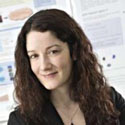Advisory Board and Editors Computational Biology

Lennart Martens
Professor of Systems Biology at Ghent University, Belgium and Group Leader of the Computational Omics and Systems Biology (CompOmics) group at VIB, Belgium. Editor or Editorial Board Member for several other journals, including PLoS ONE, Proteomics, Amino Acids, Molecular BioSystems, and BBA - Proteins and Proteomics. Author of three text books in the field of Proteomics Informatics.
Alessio Martino
Alessio Martino graduated summa cum laude in Communications Engineering at University of Rome "La Sapienza", Italy, 2016. From 2016 to 2019, he served as PhD Research Fellow in Information and Communications Technologies at the same University (Department of Information Engineering, Electronics and Telecommunications), with a final dissertation on pattern recognition techniques in non-metric domains. During his PhD, he also served as scientific collaborator with Consortium for Research in Automation and Telecommunication, Rome, Italy.
After obtaining the PhD, he was granted a 1-year Post Doctoral Research Fellowship at University of Rome "La Sapienza" and a 1-year Post Doctoral Research Fellowship at the Italian National Research Council (Institute of Cognitive Sciences and Technologies). Since February 2022, he is Assistant Professor of Computer Science at LUISS University.
His research interests include machine learning, computational intelligence and knowledge discovery. Currently he's focusing on large-scale machine learning, advanced pattern recognition systems, big data analysis, parallel and distributed computing, granular computing and complex systems modelling, in applications including bioinformatics and computational biology, natural language processing and energy distribution networks.
He serves as Editor for several journals and regularly serves as Technical Program Committee member for several international conferences. Alessio Martino is also a member of the IEEE.

Carla N Mavian
My research aims at understanding the eco-evolutionary pathways that lead to emergence and dispersal of zoonotic and human pathogens, with emphasis on land use and climate change, within the One Health approach. I employ genomics, metagenomics and phylodynamics as tools to elucidate the evolutionary processes and population dynamics that shape viral genetic diversity both at the inter-host (epidemics) and in intra-host level (individual infections).


Dezső Módos
I am a medical doctor and a systems biologist. During my scientific carrier, I have tried to understand diseases and find novel approaches to treat them with drugs, whether it is cancer or UC. I finished the Semmelweis University Doctor of Medicine course on 2012 and then started my PhD in network biology. I was involved in developing multiple biological network databases transcription factor-target layers such as SignaLink, AutophagyRegulatory Network or the NRF2Ome. My main project was to understand signalling networks in cancer and how the different paralogues of a protein can act in the signalling network.
Since then I have been a Postdoctoral Research Associate at Cambridge University, where my main focus was how can we use networks to predict mechanisms of action of compound combinations. I used various chemical informatics techniques besides network biology such as chemical fingerprints, machine learning and gene expression-based toxicity prediction.
Currently, I am working at the Earlham Institute and Quadram Institut in Norwich researching inflammatory bowel disease and using network biology to decipher the pathogenesis of complex disorders.
I have recently moved to Imperial College, London to go through the therapeutic celling in IBD using systems biology.

Bálint Molnár
Dr. Bálint Molnár is an Associate Professor and Lecturer within the Department of Information Systems at Eötvös Loránd University, Budapest, Hungary.
His research interests include, but are not limited to, Formal, mathematical-based models for designing, modeling, and validating information systems; Application of data science methods to solve data, function, and process integration issues of enterprise management and health information systems. Enterprise, organizational, business, information systems architecture, and application of formal models.

Christopher J Mungall
I am a Computer Research Scientist in the Environmental Genomics and Systems Biology division at Lawrence Berkeley Laboratory. My work focuses on computational methods for representing and interpreting complex biological data, in particular through the development and application of knowledge representation structures such as ontologies.

Catherine E Myers
Dr. Myers joined the Neurobehavioral Research Lab at VA NJHCS in 2009 and joined NJMS as a Professor in 2011. Her research interests focus on understanding the brain substrates of learning and memory, using techniques including computational neuroscience and human experimental neuropsychology.
She has authored and co-authored over 100 peer-reviewed scientific articles and several books including the undergraduate-level textbook “Learning and Memory: From Brain to Behavior.”

Sushma Naithani
Sushma Naithani is an Associate Professor Senior Research in the Department of Botany and Plant Pathology at Oregon State University, USA. The current focus of her research is on understanding information flow in living systems and how evolution shapes this flow using systems-level pathway modeling supported by high-quality biocuration, gene-orthology-based predictions, and analysis of omics data. She serves as a senior curator for the Plant Reactome knowledgebase. Sushma has authored 31 peer-reviewed refereed research articles in high-impact journals, including Nature, Nature Biotech, PNAS, etc. One of her research papers has been selected by the 'Faculty of 1000 Biology'. In addition, she has authored six book chapters and one Open Textbook (S. Naithani (2021): History and Science of Cultivated Plants published by Oregon State University Open Educational Resources, EBOOK ISBN: 978-1-955101-08-0, available at https://open.oregonstate.education/cultivatedplants). She is also an Associate Editor for Frontiers in Plant Science-Plant Biotechnology and served as the Editor-in-chief of the Current Plant Biology (2017-2023).

Hamed S. Najafabadi
Assistant Professor of Human Genetics at McGill University, Canada Research Chair in Systems Biology of Gene Regulation. Studying the mechanisms of transcriptional and post-transcriptional gene regulation and their role in human diseases.

Rafael J Najmanovich
Associate Professor, Systems & Structural Computational Pharmacology. University of Montreal, Canada. Postdoc EMBL-EBI. PhD Physics & Biology, Weizmann Institute of Science, Israel. MSc Statistical Biological Physics & BSc. Molecular Sciences, University of São Paulo, Brazil.

Kenta Nakai
Professor of Human Genome Center, the Institute of Medical Science, the University of Tokyo, Japan. Editor of DNA Research and Mathematical Biosciences. Former president of the Japanese Society of Bioinformatics.

